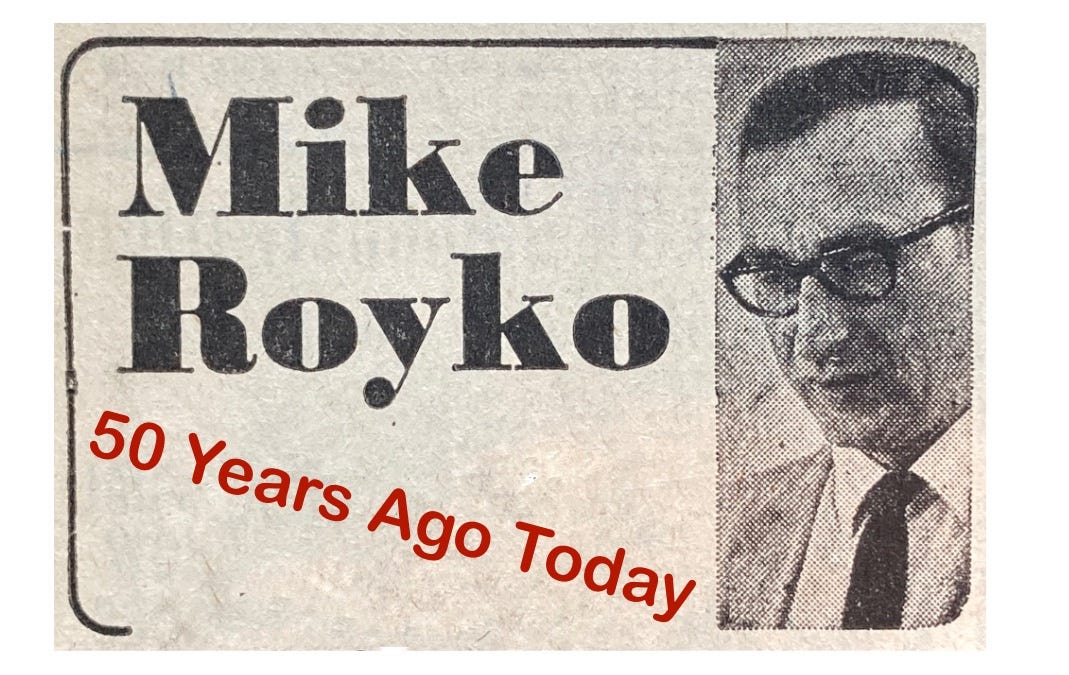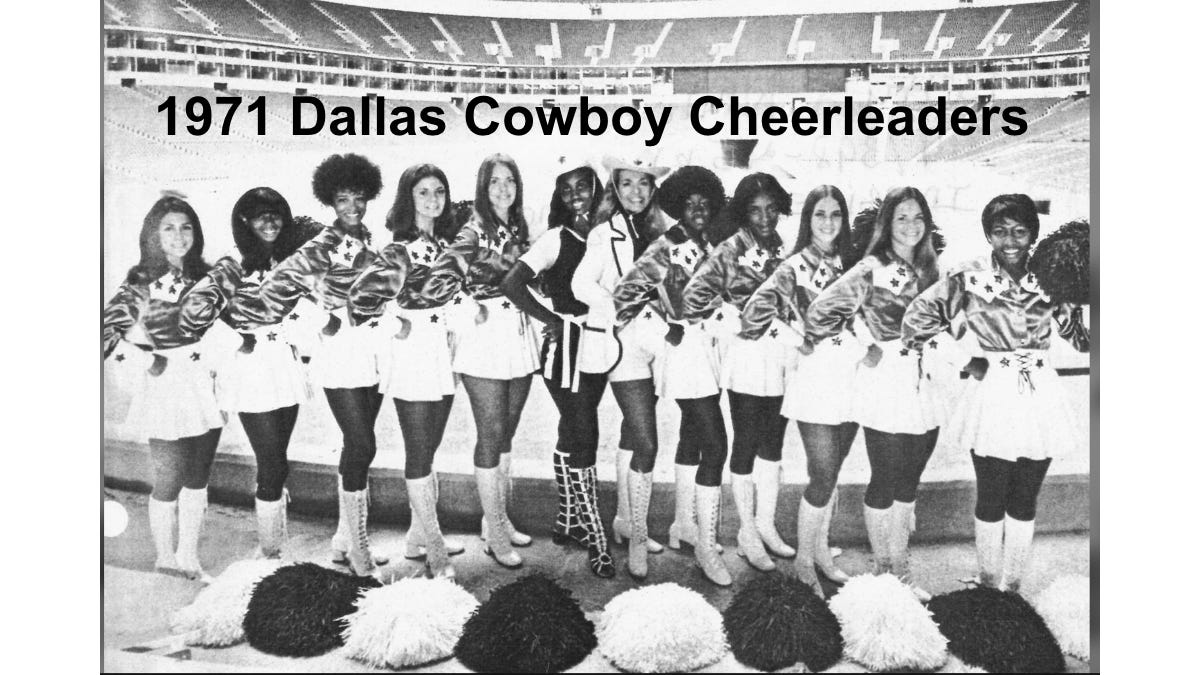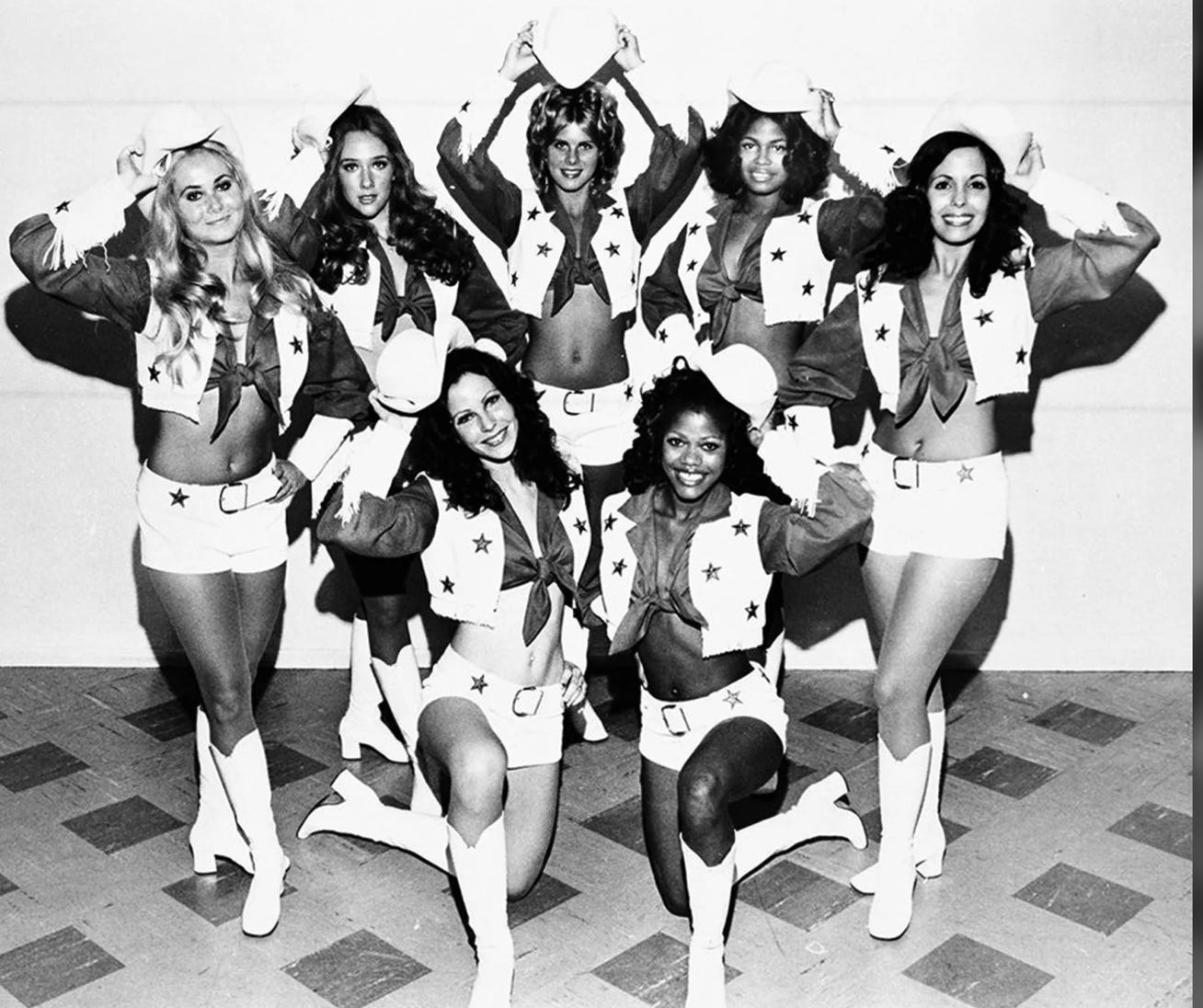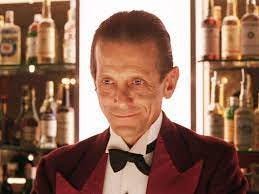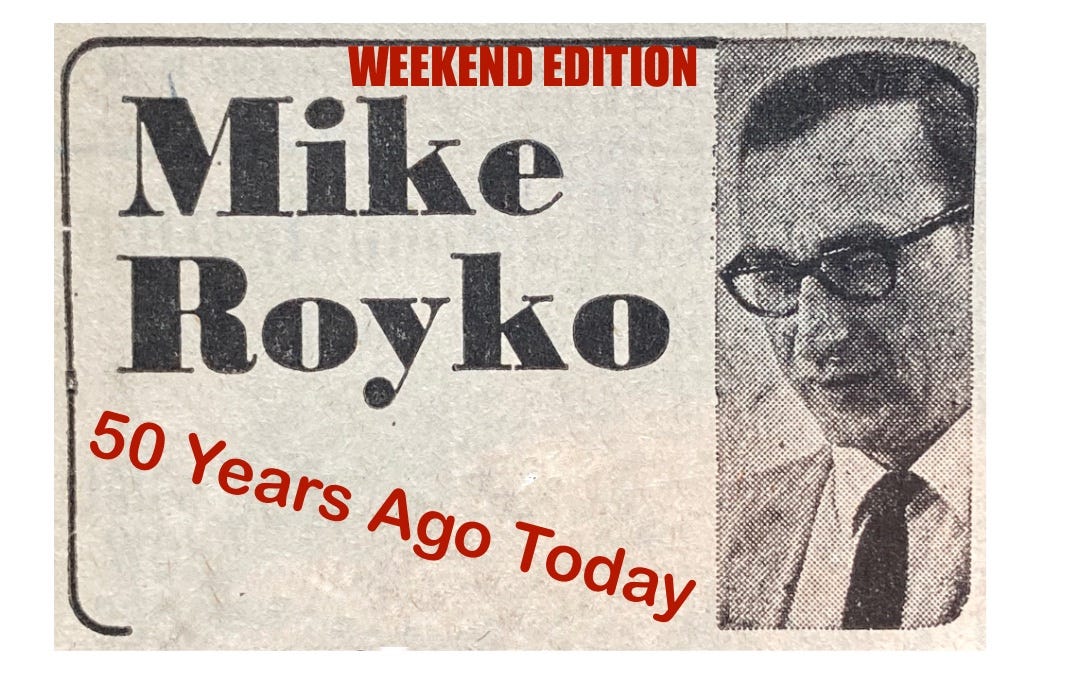Mike Royko 50 Years Ago Today: Mike sneers at Dallas Cowboys cheerleaders
Weekly Compilation Nov. 1-7, 1971
To access other parts of this site, click here for the Home Page.
Why do we run this separate item, Mike Royko 50 Years Ago Today? Because Steve Bertolucci, the hero of the serialized novel central to this Substack, “Roseland, Chicago: 1972,” lived in a Daily News household. The Bertolucci’s subscribed to the Daily News, and back then everybody read the paper, even kids. And if you read the Daily News, you read Mike Royko. Read our Royko briefing Monday-Friday on Twitter, @RoselandChi1972.
November 1, 1971
Grid shows mostly ‘blat’
Mike sneers at the Dallas Cowboy Cheerleaders’ performance during this week’s Bears game. He prefers George Halas’ cheap, boring half-time shows, the “elderly” Chicago Bears Band or local high school marching bands, so he claims.
“Year after the year,” says Mike, “the most excitement at half time for a Bear fan has been fighting his way to the men’s room.” And Mike likes it that way, he says.
“But Sunday it finally happened. The girlie-girlie show reached a Bear game. And it figured that the Dallas Cowboys would bring the show to town with them.” Mike takes a moment to disparages Texans.
Mike describes the girlie-girlie show, and it's boring. A little running around, a kick or two, forming circles. “What they do is not nearly as difficult as the manual drunken driving test given in any police station." It's Mike, so I thought he must be kidding. I mean—the Dallas Cowboy cheerleaders are famous, and that’s not what they’re famous for.
Mike concludes he’s happy to report that “Bear experts doubt that Halas will present many more of these half-time extravaganzas. Not unless the other team pays for them.”
So, was Mike kidding? Yawning at the famously risqué Dallas Cowboy Cheerleaders?
I checked. The Cowboys actually have group photos of their cheerleaders going back 56 years. The photos are both educational, and profoundly disturbing.
The yearly photos show the 1971 Dallas Cowboy Cheerleaders were the last set to look, and presumably act, like they walked off an Andy Hardy movie. Here they are in demure poses and outfits—go-go boots, short but not obscene white skirts, and long sleeve buttoned-up shirts:
Then in 1972, the cheerleaders don the now iconic Dallas cheerleader outfit: white hotpants, bare midriffs, short white vests with blue stars. They still manage to look somewhat wholesome:
But each succeeding year there are more women, the shorts somehow get smaller, the poses increasingly lurid. Front row women lay invitingly on the ground.
The grinding uniformity of each group—big hair, big boobs, big exposed midriffs, often panting expressions—gives the distinct feeling that you're looking at the same women every year.
“You’ve always been a Dallas Cowboys Cheerleader, Mr. Torrance” is the phrase that comes to mind.
So I guess Mike saw the last truly tame Dallas Cowboy Cheerleaders in 1971. And he could never guess in ‘71 that George “Papa Bear” Halas would create the Honey Bears to distract from the actual football after the Bears’ disastrous 1975 season.
But Mike accurately predicted Papa Bear would never provide an expensive half-time show. The Honey Bears started making $15 per game, and ended at $20. After Papa Bear’s death, daughter Virginia McCaskey dumped the cheerleaders when their contract expired at the end of 1985.
November 2, 1971
The making of a disciple 1971
Mike makes fun of 1971's young adults, who are today the people being made fun of for NOT being young, via the already outdated phrase “OK Boomer.” In a way I feel sorry for Baby Boomers.
Mike says a young man stopped him in the street and urged him to embrace Jesus. “I told him I would embrace whom I choose, without any help from him, and if he didn’t move aside I would step on his bare toes.”
Then Mike realizes he knows the young man, Ernest Generation.
“I have become a Jesus freak,” Ernest explains.
Jesus freaks were a real thing—see the lyrics to “Tiny Dancer.” I found them scary as a kid. You'd see them roaming downtown streets in groups. Mike recalls previous stages of Ernest Generation’s life--he joined the Free Speech movement but got hoarse, etc.
Now Ernest has discovered Jesus, from hearing “Jesus Christ Superstar” on the radio.
“You had never heard of him before?” asks Mike. “Yes, but I had always thought he was middle-aged and into Bach organ music,” says Ernest. “I didn’t realize he was into young rock music, or that he was a superstar.”
"It has been a long philosophical journey for you," Mike observes.
November 3, 1971
Don’t blame Ogilvie
One of Mike’s regular columns of “Letters, calls, complaints and great thoughts from readers”.
Today, Mike does something unusual: He answers a letter seriously.
“It never fails that when you get a Republican in office, they try to make a name for themselves by kicking around the poor,” writes C.T. of Chicago. “I’ve never heard of anything as inhuman as Gov. Ogilvie’s reducing of welfare payments.”
C.T. refers to what papers have been referring to as Gov. Ogilvie's 60% reduction in benefits for general assistance welfare. The cuts were to begin Nov 1, but a Circuit Court judge granted a 30-day stay after Cook County sued. The papers have been running stories about desperate families fearing the cuts.
Mike argues the trouble is “bureaucratic bumblers in the Cook County Department of Public Aid.” Gov. Ogilvie, he says, tried unsuccessfully to get CCDPA to transfer people in the general assistance category to more specific ones, because general assistance is paid 100% by state and local taxes, while federal dollars pay half or more for specific categories.
“The result has been the loss of hundreds of millions of federal dollars by Cook County," says Mike.
Why? Because the CCDPA "doesn’t want to do the paper work" to transfer general assistance recipients, says Mike. Ogilvie hoped to force transfers to federally-funded categories by slashing general assistance payments.
Instead, says Mike, Cook County "responded by clouding the issues, walking off their jobs, and turning it into a political issue...This mess was created right here in Cook County, not in Springfield, and that’s where the blame belongs. Next insult.”
This whole issue is so complex that the Daily News today runs a lengthy analysis looking at the welfare question since Ogilvie unveiled his budget in March, and someone whose job it was to study this issue finds confusion at every stage. However, it appears Mike's basic facts are correct.
Ogilvie did urge Cook County to transfer recipients to federally-funded categories--but when some hoped-for federal money didn't come through, Ogilvie also cut state funding. For a time, the analysis says, Cook County President George Dunne and the Democratic Party accepted the need for transfers, and were going to cooperate.
Until they didn't, and Cook County instead announced it would slash general assistance payments by 60% due to the reduced state funding. Since then, however, the two sides have talked and agreed for Cook County to hire 150 new clerks to step up transfers to federally-funded welfare programs.
November 4, 1971
A ‘holy’ new wristwatch
For the second time this week, Mike writes about young Jesus freaks—and by “young” in 1971, we mean people who are now at least over 65. Jesus freaks really were a thing at the time, and “Jesus Christ Superstar” had just exploded on the airwaves, though the two were not actually connected.
Today, Mike tells us about the new Jesus wristwatch and its $250,000 ad campaign “most of it directed at young Jesus-freaks, who are suddenly taken with ‘Jesus Christ Superstar.’”
The watch face sports the face of Jesus, and comes in either white Jesus or black Jesus.
Most of the column is direct quotes from one of the watch company’s owners. This isn’t one of Mike’s finest. It’s hard to figure why he bothered. He must have been hard up for a subject that day. We’ll just give you one good quote:
“The integrity of Jesus is retained. We haven’t made a pot head out of him. All we’ve done is given Him a smile. We’ve taken Him out of the church and off the cross and put Him on a watch.”
For Younger Readers, “pot-head” was a term for someone who overindulged in marijuana, which was often called “pot.”
November 5, 1971
‘Outright lies,’ cries the Union
Remember Oct. 28 when Mike told us about Ronald Becker, the sheet metal union worker kicked out for falling $85 behind on his dues, and the union lawyer wouldn’t even return phone calls from Becker’s Legal Aid lawyer for two months? See last week’s Royko compilation here for the full hilarious backstory.
The union lawyer was Michael Daley, the real Mayor Daley’s son, which made for a fun Royko column. Daley and the union wouldn’t talk to Royko last week, and now they’re furious that he didn’t talk to them before tearing them apart in his column.
Today Mike makes the union look foolish just by printing their own words, a classic Royko strategy:
“We feel the newspaper writer (me) should have gotten the facts before writing a biased fabricated lie about our union,” they wrote Mike’s boss at the Daily News.
Mike answers: “Gentleman, let me refresh your memories…repeated efforts were made to get your side. Don’t you remember the phone calls? Don’t you remember your refusal to discuss the case? Don’t you remember your lawyer’s refusal to discuss the case?”
Here, Mike lives out every reporters dream when he gets to tell the uncooperative subject who then complains: “You had an ample opportunity to present the ‘facts,’ as you see them. So don’t whine that the story didn’t present your side.”
None of the “outright lies” the union claims Mike presented hold water, or they are minor discrepancies that change nothing. But Mike notes the union made its own mistake when writing to his boss when they said, “One thing that biased nonunion oriented people like writers fail to understand is” blah blah blah.
“Nonunion oriented?” asks Mike. “I am currently a dues paying member of two unions. Now, if you had called me up and tried to get the facts, you wouldn’t have made such a dumb misteake. Tsk, tsk.”
November 6-7, 1972
As we here all know, weekends could be sad for a Daily News family because Mike Royko wasn’t in the Daily News’ single weekend edition. So we look for Mike elsewhere on the weekends.
Today, let’s consider the question of why Mike Royko isn’t very well known outside Chicago. Are people like Jimmy Breslin more famous simply because they are from bigger New York?
This is a question I’ll pose to other, better-informed people, and see what answers I get. So we’ll revisit. Today, I’ll speculate that it was because you almost never saw Mike Royko on TV, even in Chicago, much less nationally. Mike Royko was a picture in the paper, and words, to most people. Not flesh and blood.
On election night, TV news stations love to add newspaper people to the panels of experts watching returns. Mike almost never even did that. I remember once being floored to see him on an election night, I think on Channel 2. To hear his voice was just amazing. It was deep and gravely.
In his wonderful biography “The World of Mike Royko,” Doug Moe notes this aversion of Mike’s to TV and publicity in general.
“Royko always claimed to have never sought fame, and though he wasn’t above using his name to get a restaurant table or meet a pretty girl, his claims seem accurate. He spurned the lecture circuit—and considerable riches—and almost never went on television, despite repeated requests. Royko once laughed that he held the record for saying no the most times to Ted Koppel’s Nightline.
Royko explained: “The bad part of winding up as something I never wanted to be, and I try to avoid being—a celebrity journalist—is if you go somewhere to cover something, you wind up getting more attention than the person or event you’re covering….The first three years I had a column my picture wasn’t in the paper. Number one: It isn’t a very pretty picture. Number two: I didn’t want people to know what I looked like.”
Another reason Mike probably didn’t like being recognized is that he seems to have gotten into quite a few fights and smaller altercations in bars. But we’ll leave that subject for another time.
Now that I want to describe Mike Royko’s voice, I can only think of Rick Kogan, who before his current incarnation as dean of old school Chicago journalists who knows all, was a young friend of Mike’s. You can hear Rick on his WGN show every Sunday 5-7 PM, or delve into past shows via his WGN page here, or his Facebook page here.
By complete coincidence, I see now that on today’s show (Sunday November 7, 2021) from 5-5:30 PM, Rick will talk about his friend writer/videographer Scott Jacobs who sadly recently died. Rick will include “an amazing video” Scott Jacobs shot at the Billy Goat in 1982--”Mike Royko giving a stunning talk on 16-inch softball. Is there any other other kind?”
Not surprisingly, Studs Terkel talked with Mike on his long-running radio show. Here, they discuss Mikes’ biography of the real Mayor Daley, “Boss”: Mike on Studs.
By the way, this feature is no substitute for reading Mike’s full columns. He’s best appreciated in the clear, concise, unbroken original version. Mike already trimmed the verbal fat, so he doesn’t need to be summarized Reader’s Digest-style, either. Our purpose here is to give you some good quotes from the original columns, but especially to give the historic and pop culture context that Mike’s original readers brought to his work. You can’t get the inside jokes if you don’t know the references. Plus, many columns didn’t make it into the collections, so unless you dive into microfilm, there are some columns covered here you will never read elsewhere. If you don’t own any of Mike’s books, maybe start with “One More Time,” a selection covering Mike’s entire career and including a foreword by Studs Terkel and commentaries by Lois Wille.
Do you dig spending some time in 1972? If you came to MIKE ROYKO 50 YEARS AGO TODAY from social media, you may not know it’s part of the book being serialized here, one chapter per month: “Roseland, Chicago: 1972.” It’s the story of Steve Bertolucci, 10-year-old Roselander in 1972, and what becomes of him. Check it out here.
To get MIKE ROYKO 50 YEARS AGO TODAY in your mailbox weekly along with THIS CRAZY DAY IN 1972 and new chapters of the book—
SUBSCRIBE FOR FREE!



